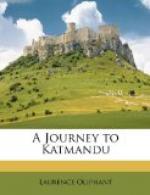CHAPTER II.
Benares—Cashmere Mull’s House—The Chouk—The Bisheshwan Temple, and Maido Rai Minar—Jung Bahadoor in Benares—A Rajah’s visit—The marriage of Jung Bahadoor—Review of the Nepaul Rifle Regiment—Benares College.
Whatever may be said of the large salaries of the Bengal civilians, they certainly deserve great credit for the praiseworthy employment of their wealth; and making amends as it were for the backwardness of India as regards hotels, they supply their places to the friendless traveller, in a way which our frigid friends at home might imitate with advantage. I look back upon my stay in Benares with the greatest pleasure, and shall long remember the kindness I there experienced.
There is much to be seen in the Holy City, and the means of locomotion which I should recommend the sight-seer to adopt are Tom Johns, or chairs swung upon poles, with or without hoods, as the case may be. Upon arriving at the Chouk or Market-place, we hired two of these conveyances and started to see the residence of Cashmere Mull. But first I must make an attempt, however unsuccessful, to describe the Chouk: it is a large square, studded with raised oblong platforms without walls, the roofs being supported by fluted Ionic columns. The Police Court, in which a Native magistrate presides, forms one side of the square. On the platforms sit the vendors of shawls, skull-caps, toys, shells, sugar-cane, and various other commodities; but to enumerate the extraordinary diversity of goods exposed for sale, or to describe the Babel of tongues which confound the visitor as he wanders through the motley crowd, would be impossible.
We turned out of the Chouk down a narrow street about three feet broad, gloomy from the height of the houses, and unpleasant from the great crowd and close atmosphere; every now and then we got jammed into a corner by some Brahminee bull, who would insist upon standing across the street to eat the fine cauliflower he had just plundered from the stall of an unresisting greengrocer, and who, exercising the proud rights of citizenship, could only be politely coaxed to move his unwieldy carcase out of the way.
We wended our way through pipe bazaars and vegetable bazaars, where each shopkeeper has a sort of stall, with about three feet frontage to the street, but of unknown depth, and a narrow balcony supported by carved wood-work over his head, out of the latticed windows of which bright eyes look down upon the passengers. Whenever there is a piece of wall not otherwise occupied in this compact and busy city, you see depicted, in gaudy colours, elephants rushing along with dislocated joints in hot pursuit of sedate parrots, or brilliant peacocks looking with calm composure upon camels going express, who must inevitably crush them in their headlong career, but the vain birds, apparently taken up with admiration of their own tails, are blind to the impending




